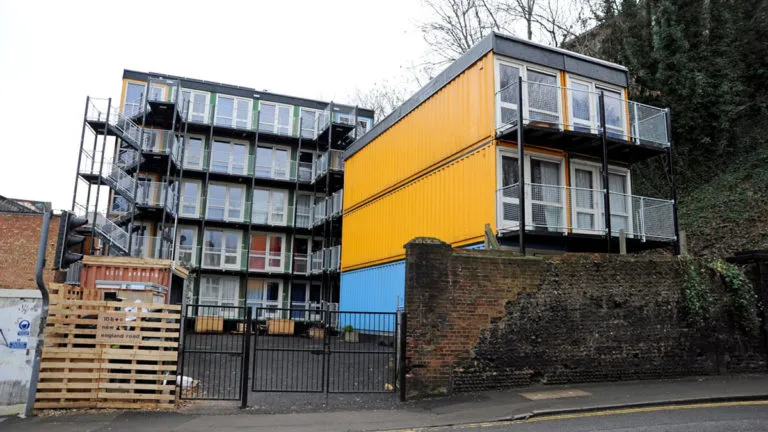Parents raising children in box containers shows the severity of the housing emergency
Published: by Polly Neate

A safe, secure, and affordable home is the basis of a good childhood. It’s a fundamental human need and that means it should be a right. But for tens of thousands of families across the country this right is denied, as the appalling human cost of our national housing emergency continues to grow.
At Shelter, our services hear all too often from people struggling at the sharp end of the housing crisis. Like the 18-month-old whose developmental milestones were not met – because the hostel single room where his family lived was wall to wall beds, with no space to learn to crawl. Or the 13-year-old boy sharing one room with his mother and sister, with no privacy, too ashamed to invite friends round, with nowhere to do homework or just have his own space.
So the publication of two separate reports this week highlighting the thousands of families trapped in inappropriate temporary accommodation or [squeezed into one bedroom flats](http://housing.org.uk/press/press-releases/130000-families-forced-to-live-in-one-bed-flats/(opens in a new tab)) came as no great surprise. But that shouldn’t make them any less shocking or damning. These children are not the ones who should be ashamed that these living conditions are so common in 21st century Britain.
Published on Wednesday, the Children’s Commissioner’s Bleak Houses report joins a long list of studies that prove beyond doubt that the housing system in our country is broken. Among its many findings, the report shone a spotlight on the 90,000 children who are ‘sofa surfing’ – dependent on the goodwill of friends and family, with no home of their own – and revealed that some local authorities have no option but to ‘house’ families in poorly converted office blocks and even old shipping containers.
If that wasn’t enough evidence of the country’s housing emergency, yesterday the National Housing Federation published new analysis showing that 130,000 families are now forced to live in one-bed flats, with as many as 627,000 children having to share a room with their parents. The devastating impact this can have on a child’s development and wellbeing cannot be overstated.
Over the past week, I have been repeatedly asked the same question by journalists, friends, work contacts: how on earth did we get here?
The answer is pretty obvious.
Firstly, over the past forty years we’ve forgotten the value of social homes. A council house was the foundation of a good life for millions during the 1960s, 70s and 80s. Then social housing seemingly fell out of our national conversation. And the building of social housing has all but stopped in recent years, with only 6,434 new social homes built last year – and that’s against a waiting list of 1.1 million households.
Secondly, housing benefit reforms have hit families on low incomes with devastating force. The freeze to housing allowance, for example, means that in 97% of areas a small family can’t afford even the cheapest local rents. Putting many at risk of homelessness and forcing others into unacceptable conditions in temporary accommodation – as highlighted in the Children’s Commissioner’s report.
Thirdly, priorities have all too often been in the wrong place on housing. Since 2013, the expansion of permitted development, which allows offices to be converted into homes without going through normal planning system checks, has delivered tens of thousands of new homes. But all too often these are poor quality, isolated (on an industrial estate for example), cramped, even downright dangerous ‘units’ that then end up being used by overstretched councils as temporary accommodation.
Finally, the power of landlords over their tenants tips many into homelessness. In particular, the use of section 21 ‘no fault’ evictions, which mean private renters can be turfed out of their home for no reason with only eight-weeks’ notice. The previous government signalled it would end section 21, and this must be an immediate priority.
So, the causes of this nightmare are not complex. And the solution is even more simple: we urgently need our new government to start delivering social rented homes, and to do it soon.
Only social homes can offer the true affordability and stability, that families who are priced out of private renting and home ownership, need. Space for children to thrive, space for parents to save for the future, and a fair chance at building resilience as a family and as individuals. It is in fact a human right.
We need a building programme for three million social rent homes. We need section 21 to be consigned to history. We need housing benefit restored to a level that meets basic local rents. Then everyone in our country will have a stable roof over their head. Every child will have a safe home. And only then can we start to feel proud of our housing system again.
Weeks like this, where the housing emergency dominates the headlines, should be a wake-up call to everyone in our society, and especially to a new government. The time for action is now and I look forward to working with the government to deliver the change we need.
This article originally appeared as commentary in the Daily Express and can be found here.